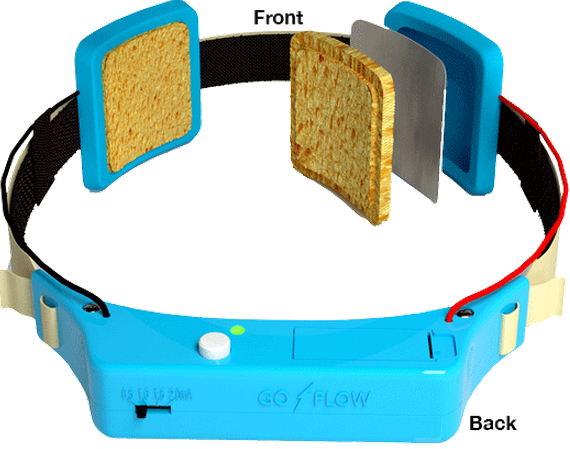
Transcranial direct-current stimulation device (credit: GoFlow)
Lightly stimulating the brain with transcranial direct current stimulation (tDCS) may improve short-term memory in people with schizophrenia, according to a new study by researchers at the Johns Hopkins University School of Medicine.
The tDCS procedure involves placing sponge-covered electrodes on the head and passing a weak electrical current between them.
David Schretlen, Ph.D., a professor of psychiatry and behavioral sciences at the Johns Hopkins University School of Medicine, reasoned that this type of brain stimulation might ease some of the cognitive difficulties that afflict people with schizophrenia.
A test based on prefrontal cortex stimulation
To test that possibility, Schretlen and Johns Hopkins colleagues targeted a brain region called the left dorsolateral prefrontal cortex, which plays an important role in short-term or working memory and is abnormal in people with schizophrenia, according to Schretlen.
Schretlen recruited 11 participants: five adults with confirmed schizophrenia and six of their close relatives (parents, siblings, and children of people with schizophrenia show some of the same abnormalities to a lesser degree, says Schretlen).
Each participant received two 30-minute treatments — one using a negative electrical charge, which the researchers thought might prove beneficial — and the other using a positive charge as a control. During and after each treatment, participants completed a battery of cognitive tests.
Thinking improvements
There were two notable results:
- On tests of verbal and visual working memory, participants performed significantly better after receiving a negative charge, and the effects were “surprisingly strong,” says Schretlen.
- Participants did better at the challenging task of switching between naming categories of items in a supermarket after a negatively charged treatment. The stimulation “was associated with better performance on working memory and subtle changes in word retrieval,” Schretlen says. People with schizophrenia often struggle to find the right words, he says. Because the prefrontal cortex contains a brain region responsible for word retrieval, Schretlen reasoned that transcranial direct current stimulation might help.
Schretlen is now studying transcranial direct current stimulation in a larger sample of patients using repeated sessions of stimulation, which he hopes will induce lasting benefits.
“Cognitive impairment is as ubiquitous as hallucinations in schizophrenia, yet medications only treat the hallucinations,” Schretlen says. “So even with medication, affected individuals often remain very disabled.” His hope is that transcranial direct current stimulation could give people with schizophrenia a shot at leading a more normal life.
Other findings
A related study last year showed that tDCS improved correction of mistakes. But another recent study found that after a repeated IQ test (which is normally expected to show improvements), IQ scores of people who underwent tDCS brain stimulation improved markedly less than did the IQ scores of people in the placebo group.
The tDCS procedure is also being studied by other researchers as a treatment for depression and Alzheimer’s-related memory loss, and to enhance recovery following strokes.
The research is described in a paper published online in Clinical Schizophrenia and Related Psychoses. The study was funded by the Therapeutic Cognitive Neuroscience Professorship; the Therapeutic Cognitive Neuroscience Fund; the Benjamin and Adith Miller Family Endowment on Aging, Alzheimer’s and Autism; and the National Institute on Child and Human Development.
Abstract of Can Transcranial Direct Current Stimulation Improve Cognitive Functioning in Adults with Schizophrenia?
Cognitive impairment is nearly ubiquitous in schizophrenia. First-degree relatives of persons with schizophrenia often show similar but milder deficits. Current methods for the treatment of schizophrenia are often ineffective in cognitive remediation. Since transcranial direct current stimulation (tDCS) can enhance cognitive functioning in healthy adults, it might provide a viable option to enhance cognition in schizophrenia. We sought to explore whether tDCS can be tolerated by persons with schizophrenia and potentially improve their cognitive functioning. We examined the effects of anodal versus cathodal tDCS on working memory and other cognitive tasks in five outpatients with schizophrenia and six first-degree relatives of persons with schizophrenia. Each participant completed tasks thought to be mediated by the prefrontal cortex during two 30-minute sessions of tDCS to the left and right dorsolateral prefrontal cortex (DLPFC). Anodal stimulation over the left DLPFC improved performance relative to cathodal stimulation on measures of working memory and aspects of verbal fluency relevant to word retrieval. The patient group showed differential changes in novel design production without alteration of overall productivity, suggesting that tDCS might be capable of altering selfmonitoring and executive control. All participants tolerated tDCS well. None withdrew from the study or experienced any adverse reaction. We conclude that adults with schizophrenia can tolerate tDCS while engaging in cognitive tasks and that tDCS can alter their performance.
